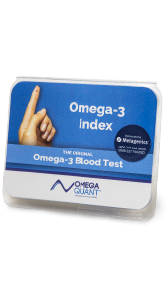Fish oil & Omega 3 – The benefits to your health
Your Secret Weapon Against Chronic Disease

Chronic diseases such as cardiovascular disease, Alzheimer’s disease and arthritis are common in our society. If you are managing a chronic health condition, you may be interested to learn that fish oil can help manage and reduce the risk of some of these potentially life-threatening conditions.
Fish oil is a plentiful source of omega-3 fats, particularly EPA (eicosapentaenoic acid) and DHA (docosahexaenoic acid) which have many therapeutic benefits. Omega-3 is required for the healthy functioning of almost every cell in your body, and is especially important for your brain, heart, and nervous system.
Make sure you are getting enough omega-3 – it’s vital to your health!

What Fish Oil Can Do For You
Omega-3 rich fish oil can benefit you, whatever your age or life stage.
In pregnancy, it helps the baby’s brain develop, and also supports healthy brain and nervous system growth throughout childhood.
Omega-3 can support healthy mood in adults, and protect memory, concentration and cognitive function as you age. It also greatly benefits heart health, reducing the risk of cardiovascular disease.
The anti-inflammatory actions of omega-3 aid in managing many chronic health issues, particularly relieving joint pain of arthritis commonly experienced in later life.
Ensure you have good levels of omega-3 and reap the rewards.
How Do You Know You’re Deficient?
Omega-3 fatty acids are essential nutrients, meaning they cannot be made by the body and therefore need to be taken in through your diet. While many try to consume omega-3 foods such as oily fish (e.g. salmon, tuna) and nuts and seeds, deficiency is still extremely common in Australia with 80% of adults not meeting the recommended daily intake (RDI) of this essential nutrient.
The best way to know if you have a deficiency is to visit your natural healthcare Practitioner who can do a simple in-clinic test called the Omega-3 Index Test to assess your levels, or carefully review your diet to see if you are getting what you need.
If your levels are low, your Practitioner can recommend dietary changes plus the best fish oil at a therapeutic dose, so you can get results.

Don’t Settle For Less – cheap is not good oil!
If quality is important to you, don’t be tempted by the cheap tubs of fish oil you see in the supermarket. These oils are often rancid (oxidised), giving them an unpleasant fishy odour and taste, and also reducing their health-promoting effects. They may also be contaminated with chemicals such as pesticides, or heavy metals, which may be harmful for your health.
Insist On High Quality Fish Oils
You can be confident your Practitioner will only recommend high quality fish oils made using processes that increase the purity of the oil and reduce heavy metal and pesticide levels, ensuring it remains fresh (and not rancid).
These fish oils undergo stringent quality testing to guarantee that purity exceeds Australian and international standards; with testing showing non-detectable levels of contaminants such as mercury, lead and cadmium.
With a focus on sustainability, the oils are sourced from small pelagic fish and harvested using eco-friendly practices. Look for the ‘Friend of the Sea’ stamp of approval, independently certifying the use of environmentally conscious practices.
Four Simple Ways To Reduce Your Chronic Disease Risk
In addition to fish oil, here are some ways to reduce your risk of chronic disease:
- Eat 5-7 serves of fruit and vegetables per day: Fruit and vegetables are full of fibre and other health promoting components that can reduce your risk of heart disease and many other chronic diseases.
- Incorporate more vegetarian meals into your diet: Excessive meat intake, especially red meat, has been associated with heart disease and Alzheimer’s disease.
- Reduce your intake of processed foods: This will help minimise the amount of salt and sugar you eat, which will benefit your heart and brain health.
- Exercise regularly: Exercise keeps your brain and nervous system healthy, reducing your risk of chronic disease and optimising the health of your whole body.
To assess your risk of omega-3 deficiency, and reduce your risk of chronic disease, talk to your Health Practitioner today!

Cindi Young is a leading Australian Naturopath. With a special interest in womens hormones, endocrine function; thyroid, adrenal and weight management. She uses and recommends a ketogenic diet to assist with weight management and hormone balance.
Available for naturopath consultations at The Cycle of Life, Gold Coast and in Mullumbimby, NSW. She is also available for online and phone consultations Australia wide. Cindi regularly runs workshops in her Gold Coast clinic as well as regular webinars.
Are you getting enough fish oils in your diet? Book your appointment with Cindi today.
